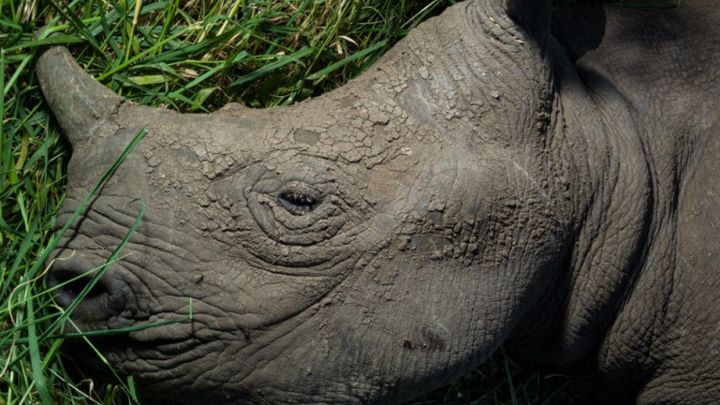
Protect rhinos from poaching -
Donation protected
I don't want to be a rhino anymore!
Rudi the Rhino doesn’t want to be a rhino anymore. Poachers have killed his mother and the young orphan is in the midst of an identity crisis. On his quest to visit Mother Nature to be changed into another animal, Rudi encounters a host of animal friends who persuade him that being a rhino is something rather special.
‘I don't want to be a rhino anymore!’ by children’s book author, Sue Linström, with illustrations by Gary Böttger, is the charming tale of one rhino’s struggle when his world is turned upside down.
Our appeal aims to raise $5,000 to print the Vietnamese language version of the book and distribute it free to young families throughout Vietnam, a major consumer of wildlife products including horn from the endangered rhino.
Children are the future. If we can reach out to young families with this enchanting book, we can make a real difference.

Explaining the genesis of Rudi the Rhino, Sue says: “The story of Rudi was born out of a bedtime story. I have two daughters and am constantly under pressure to come up with new stories at their bedtime. I always try to combine my love for nature with a life lesson, and hence Rudi the orphaned baby rhino was born.”
She continues: “As a mother of two children and a play therapist by trade, I think as adults we often under estimate the power children have to bring about change. My stories help empower children to get involved and to use their voices to create a tipping point.”
We agree. A large element of our raising public awareness is aimed at children, the future movers and shakers in Vietnam.
If you can help, your donation – however large or small – will be gratefully received. Making a donation is secure, quick, and tax deductible. It will help us fight wildlife crime.
To win the war against the crime gangs involved in this cruel and illegal trade, it will take more than just better legislation and more effective law enforcement. It will require an equally important campaign to raise public awareness and education. Only by attacking both the supply and the demand, will we be able to defeat the serious crime networks that are pushing this endangered species to the very brink of extinction.
About Sue

Sue grew up on a South African farm surrounded by a game reserve. From a young age, she became passionate about nature.
“Being blessed with those surroundings from such a young age, instilled a great respect in me for all wild animals and their habitats,” says Sue.
But even then, in her tender years, she was putting her words into action: “I remember arranging a petition when I was a very little girl to get a local zoo closed down for what I believed to be mistreatment of the animals. Even though my plight was unsuccessful, my desire to stand up for the rights of all animals has become ingrained in who I am.”
Following her unsuccessful tilt at the zoo, Sue penned the Rudi story. This was the first in a series of stories on endangered animals, and she believes she has found her writing niche. Sue noted: “I may not have had that zoo closed down all those years ago, but I hope to help educate children on our animals’ plights and encourage a respect and love for all that nature offers us.”
This latest book was written specifically so that it may be used to educate young children around the world about rhino protection. It deals with misconceptions of the value of the horn and encourages children to become ‘Rangers’ for the cause.
Such is Sue’s commitment to the cause, that she has authored Rudi the Rhino on a pro-bono basis. Her motivation is purely to help rhinos, by making children and their parents in major rhino horn consumer countries like Vietnam aware of the devastation that is being wrought on wild populations in South Africa. But, most importantly, that everyone can help rhinos in South Africa by not consuming rhino horn.
Amazing rhino facts
• The name rhinoceros means ‘nose horn’ and is often shortened to rhino.
• There are two different species of rhinoceros in Africa. There is the black rhinoceros and the white rhinoceros.
• The black rhino can grow to weigh up to 1,400 kg (3,090 lbs ).
• The white rhino can weigh around the same as a SUV.
• The white rhinoceros is considered the second-largest land mammal (after the elephant) in the world.
• Both black and white rhinos are listed as being critically endangered.
• Rhinoceros have thick, protective skin. They have a mutually beneficial relationship with the oxpecker bird. These birds eat ticks and insects off the rhino, keeping it clean and free of disease.
• Rhinoceros horn is made from a protein called keratin, the same substance that fingernails and hair are made of. Contrary to belief, they have NO healing or enhancing powers.
• Rhinoceros are herbivores (plant eaters).
• A group of rhinoceros is called a ‘herd’ or a ‘crash’.
Organizer and beneficiary
ENV Wildlife Conservation Trust
Organizer
Warrenton, VA
ENV Wildlife Conservation Trust
Beneficiary


